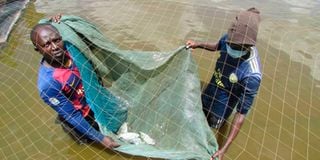The farmer who sniffed wealth in fish

Workers harvest fish from one of Patrick Kamau’s ponds on his farm in Kiamumbi in Kahawa West, Nairobi
What you need to know:
- Patrick Kamau harvests the fish, deep fries some and sells through his outlets in a rewarding business model.
- He runs two eateries, one in Kiamumbi and another in Kimbo, Ruiru along Thika superhighway.
Walking onto the farm in Kiamumbi, Kahawa West, in Nairobi, two white greenhouses catch one’s attention.
And as expected, one anticipates to see tomatoes or capsicums thriving inside. Well, lining the floor of the greenhouses are tens of black and yellow trays hosting dark-brown insects.
“These are black soldier flies (BSF),” says Patrick Kamau, the owner of the farm. “We feed them to our fish which we keep in 49 ponds,” he adds.
The modern black soldier fly production unit gives one a glimpse into the kind of fish farm Kamau runs on half-acre in the serene estate.
“These are my source of food and my economic lifeline. I live, eat and think about fish all the time,” says Kamau, who holds a diploma in mechanical and civil engineering.
His entry into fish farming was by fluke, recounts the farmer. “I was passionate about pig farming that I invested Sh200,000 on four animals when starting. The numbers increased that I ended up with 120 pigs.
However, diseases and expensive, poor quality feeds made me quit the trade,” says Kamau who keeps tilapia, catfish and a variety of ornamental fish.
He had his eureka moment on fish one day in 2006 when watching a TV programme.

Kamau (left) with his worker, Wycliffe Tete, in a black soldier flies production unit on the farm.
“From the programme, what impressed me most was the low cost of production. I learnt a fish feeds on 0.02g of its weight a day and they are not prone to diseases.”
He started a fish farm in Ruai, Nairobi, which consisted a 15 by 5 metres pond, that accommodated 500 fingerlings.
“I spent Sh110,000 on the project and in eight months, I sold most of the fish at Sh250 each. I have never looked back since then.”
Today, Kamau, a father of five, does not regret as demand for fish remains high.
“I have 17 ponds in Kiamumbi and the rest on my other farm in Ruai. Each accommodates 2,000 to 3,000 fish. I am thus able to supply 200 kilos of fish every week, with each weighing 400g to 2 kilos to fish eateries and traders who buy in large amounts for resale in the city. A kilo goes for Sh600.”
But the farmer does not only sell raw fish, he adds value by deep frying.
“I was forced to start offering ready-to-eat fish by my customers, what also made me open eateries, which provide market for my products,” he states.
Kamau runs two eateries, one in Kiamumbi and another in Kimbo, Ruiru along Thika superhighway. They are known as Tango Gardens.
Black soldier flies
“When we deep fry the fish, we earn Sh100 more and serve it with ugali, greens and vegetables,” says Kamau, who also grows indigenous vegetables.
His fish mature on time (eight months) thanks to the black soldier flies he rears, which offer them quality proteins.
“We harvest the insects at the larvae stage, 21 days after the BSF are hatched. We sun-dry 80 per cent of them, and retain the 20 per cent for continuous reproduction,” explains Wycliffe Tete, the farm worker in-charge of the insects on the Kiamumbi farm.
Francis Faluma, a fisheries officer working with Kakamega county government, says BSF is a cheaper source of protein compared to others like soya beans, fish and blood meals and cotton seed cake.
“BSF larvae are rich in protein; they offer 40 – 45 per cent crude protein. Fish requires the nutrients in plenty for them to grow faster.”
Kamau uses the two greenhouses exclusively for black soldier flies’ production. The insects’ journey starts at pupae, which is put in cages for seven days. They then grow to young flies, which start mating (male – female).
Small pieces of cartons with crevices (narrow openings) are put in the cages, where the flies find refuge. According to Tete, the cartons should first be dipped in water. “At that age, the flies only feed on water,” he states.
They lay and deposit eggs in those cartons, which are collected after every two days. The cartons are put in crates that contain a mixture of machicha and pig waste.
Major challenges
After two weeks, they come out as young larvae, which feed on substrate (mixture of machicha and pig waste). They are then stocked in different crates for development.
“Growth depends on temperature levels, if below 20°C, there would be slow growth. Between 20 – 47°C is the optimum temperature for growth,” says Tete, adding they are thereafter ready for harvesting after two weeks.
In case of surplus, a dry kilo of the insects goes for Sh150 while live black soldier flies retail at Sh100.
During the Seeds of Gold team visit on his farm, Kamau, who employs 15 workers, had over 50,000 mature fish ready for harvest and 150,000 fingerlings, which he sells at Sh12 each.
“To have good fish, you must feed them properly, maintain high levels of hygiene by ensuring water in the ponds is clean and do good marketing.”
While he had ready market for his fish, he also sells them online on Facebook and advertisers on PigiaMe website.
He isolates Covid-19 restrictions as one of his major challenges as they constrain his market, especially the closure of hotels.
“Fish farming needs patience, as one starts enjoying proceeds after at least eight months. To begin, do research on market, feeds and what customers need,” he advises.





